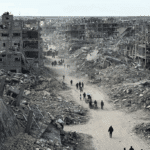Even after the revolution in 2011, when faced with everyday problems, people in Tunisia often have no other choice than to take to the streets to express their discontent. Formal participation mechanisms, such as town hall assemblies or meetings with administrators, are not always accessible and/or available to them. Avocats Sans Frontières (ASF), in partnership with the Tunisian Forum for Economic and Social Rights (FTDES), helps marginalised populations to enter into dialogue with local authorities. The aim is to guarantee human rights protection, contributing to improving living conditions.
Since the Arab Spring, the tendency to hold demonstrations and to block roads has become widespread amongst Tunisians wishing to make local authorities aware of their discontent. This situation is indicative of the difficulties in accessing the participation mechanisms that allow rights-holders to understand and claim their rights.
The town of Moulares, 400 kilometres southwest of Tunis, is a good illustration of this problem. As part of a project to support people in marginalised situations, ASF, in partnership with the FTDES, is working in this region where the unemployment rate stands at 28%. Khaled Houssein, ASF coordinator of the project, visited Moulares following the illegal exclusion of a group of young people from the recruitment process of a large mining company. He found a town enraged as a result of an entirely different problem: the water supply.
It became apparent that for several weeks, the water supply had been irregular due to a burst pipeline. This incident was negatively impacting the inhabitants’ health, and making it difficult for them to keep their livestock and cultivate their agricultural land. “We have had enough! The pipelines are broken and no one is doing anything. The children are ill because of the excrement that is gushing out of the drains! No one listen to us!” said the inhabitants. Infuriated by two successive regional governors refusing to meet them, the population of Moulares set up blockades at the town entrance.
In his role as lawyer and coordinator of an international NGO, it was easy for Mr Houssein to get access to the government administration. As a result of the demands made by the population, he was able to quickly set up a meeting with the governor. “The stakeholders were called to this meeting in order to come up with an adequate and acceptable solution. The governor took tangible measures, and the next week, the pipeline was repaired”, Mr. Houssein reportedly with satisfaction.
This situation demonstrates that rapid and effective solutions do exist, but that the mechanisms to put them in place are often difficult for local populations to access. It is crucial that administrative procedures do not depend on the good will of a single person, and that they are part of a non-discriminatory approach based on the rule of law.
Present in Tunisia since 2012, ASF works with the FTDES to support marginalised populations in the region, so that people can claim their economic and social rights. This project is being financed by the European Union.
Picture : Even after the revolution in 2011, the living conditions for Tunisian citizens are still problematic © ASF – S. Stanton



